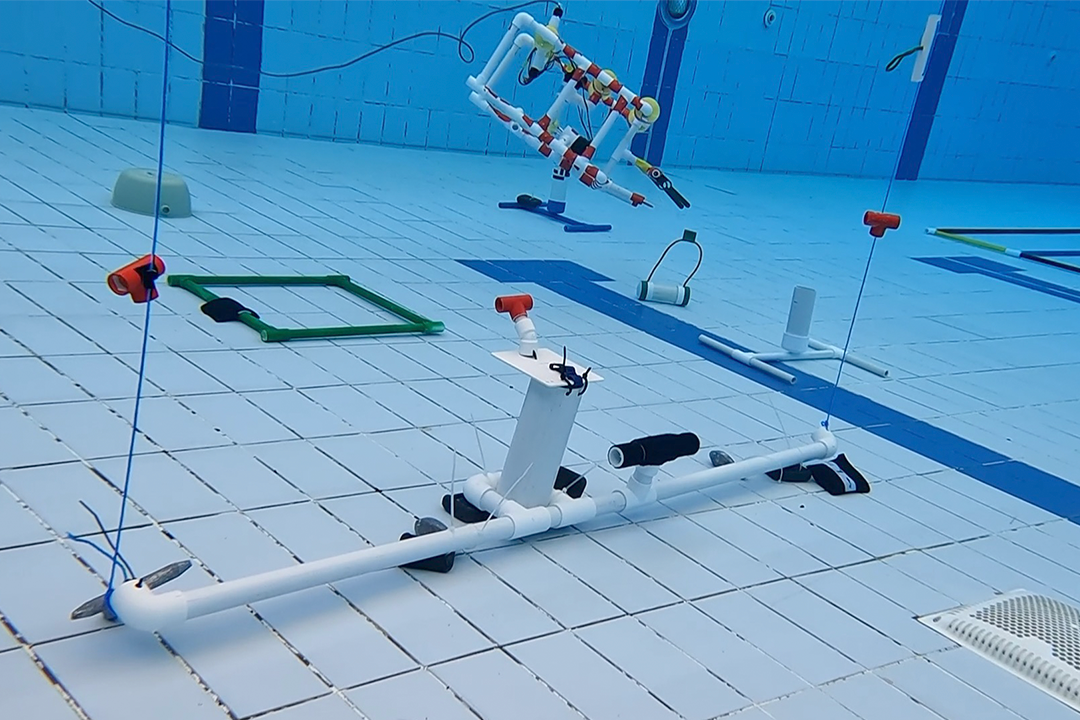KAUST at the center of marine technology in the Middle East

An ROV (remotely operated vehicle) attempting a task in the MATE Red Sea Regional
The children were gathered around the shaded pool. After months of preparation and practice, they could finally see the place where all their effort would be tested. Some were sitting, while others were on their feet trying to push friends into the water. Whatever they were doing, all were aware that a win today meant an invitation to the United States.
The pool was closed to swimmers, which explains why everyone was fully dressed and had no intention of getting wet. At least it was closed to people. The children were in the last throws of preparing their robots, which they had designed and built themselves using basic electronics, PVC pipes and pool noodles. These robots were their response to the MATE ROV Red Sea Regional, the first MATE ROV competition in Saudi Arabia and one of many activities imagined by KAUST and the Marine Technology Society (MTS) when they formed the Red Sea Section, the first MTS Section in the Middle East, this past January 9.
Regardless of where we live, our lives are deeply dependent on the sea. The sea affects weather patterns, provides our food, and is a conduit for transporting more than 80% of world trade. Realizing the importance of the sea on our prosperity, the world has been shifting towards a Blue Economy, which describes efforts to use the ocean sustainably for economic growth and a higher quality of life. Further, this decade was declared the United Nations Decade of Ocean Science, which aims to develop new technologies for ocean discovery and environmental monitoring. From a local perspective, Saudi Arabia is committing unprecedented levels of investment to the Blue Economy. In response, KAUST has positioned itself at the forefront of marine science and marine technology for the Red Sea.
To bolster its international impact further, through the leadership of Andres Espinoza, the lead marine engineer at the KAUST Coastal and Marine Resources Core Lab (CMR), KAUST and MTS have formed a new partnership through the MTS Red Sea Section. MTS has existed for more than 50 years to advance the application and awareness of marine technology to global challenges. It supports many initiatives for professional development and works not only with ocean researchers and engineers like those at KAUST and CMR, but also with policymakers, educators, businesses, and other stakeholders.
“MTS quickly recognized the importance of KAUST for marine technology in the Middle East. The section will act as a gateway for the top academic and industry organizations to work with Saudi Arabia for better use of marine resources, testing and developing new marine technologies, and growing local talent,” said MTS President Justin Manley about the decision to partner with KAUST.
In the week of May 8, the MTS Red Sea Section sponsored two events at KAUST. The first was RobotoKAUST 2023, a three-day conference that brought leading researchers at universities and institutes from ten countries as well as from leading companies to share their knowledge on robotics in marine and agriculture science.
The second was the MATE Red Sea Regional. MATE ROV (remotely operated vehicles) competitions have been ongoing since 2001 and in 2022 occurred in 19 countries. All share the same goal of teaching students from kindergarten to university to solve underwater problems using marine technology. The program has been so successful that a Hollywood movie, Spare Parts, was inspired by it.
Contestants attempting a task at Red Sea Regional.
Also inspired was CMR’s Krasimir Todorov, the coordinator of the Red Sea Regional. Last year he attended a MATE competition in Egypt and came back determined to bring the competition to Saudi Arabia.
“What impressed me the most was the continuity. Previous teams were passing their knowledge to the new generation of students. So in essence, the same teams have existed for years but the team members change,” he said. Several participants in past Egypt competitions are now employed by the marine technology sector and have even founded their own companies.
Back at the pool, the students watched anxiously as their ROVs were deployed to complete a number of underwater challenges. Like ROV missions in real life, things did not go as planned, and many teams found themselves scrambling to fix sudden equipment malfunctions by reaching for the cure used by all engineers – duct tape. The winning teams have been invited to attend the annual international championship in the United States.

A team controlling their ROV during the Red Sea Regional.
Through the MTS Red Sea Regional, KAUST and MTS plan to host future events. Already, several schools across Saudi Arabia have inquired about joining next year’s Red Sea Regional.
“We kept it small this year as a trial run. Next year, with continued support from KAUST and MTS, we expect to grow and have more schools join,” said Todorov.

